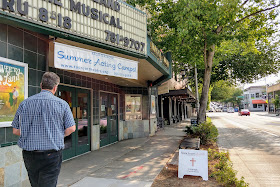The Reverend Kate E. Wesch was describing the impromptu use of the church building as a smoke sanctuary when air quality made it dangerous for children and those with breathing challenges to spend time outdoors. The families and children who came weren’t there for a worship service, she said, they were “simply enjoying this holy place.”
She talked about the meaning of the word sanctuary: a place of refuge and safety.
I appreciated hearing how members of the congregation and the community had come together to provide a place of refuge. Like most others in the Seattle area, I’d spent a good deal of the previous week concerned about the smoky air from distant fires. It was good to hear how the church had responded.
Then Kate talked about the Gospel reading for the morning, John 6:56-69. She said it was the end of the “Bread of Life” passage, and mentioned the connection with Communion. Then she quoted Take This Bread, a book that Dean and I refer to frequently, one that inspired a visit to another Episcopal church.
In that book, Sara Miles described her sudden and unexpected conversion to Christianity, a description that Kate (who said she was a “cradle Episcopal;” she'd been part of the Church her whole life) said, “has always stayed with me because it was so foreign to my experience.”
The congregation would be sharing communion -- good bread and wine -- together as the culmination of the worship service. In preparation, as she closed her sermon, Kate said that as the author of Take This Bread “found sanctuary that morning...I pray that we find it here together. I pray we find it here in this holy place of refuge.”
The smoke had, for the time being anyway, lifted outside, but inside, the sanctuary of the church was still very much present, even after the worship service when I joined others for a time of fellowship (and snacks).
I appreciated hearing how members of the congregation and the community had come together to provide a place of refuge. Like most others in the Seattle area, I’d spent a good deal of the previous week concerned about the smoky air from distant fires. It was good to hear how the church had responded.
Then Kate talked about the Gospel reading for the morning, John 6:56-69. She said it was the end of the “Bread of Life” passage, and mentioned the connection with Communion. Then she quoted Take This Bread, a book that Dean and I refer to frequently, one that inspired a visit to another Episcopal church.
In that book, Sara Miles described her sudden and unexpected conversion to Christianity, a description that Kate (who said she was a “cradle Episcopal;” she'd been part of the Church her whole life) said, “has always stayed with me because it was so foreign to my experience.”
The congregation would be sharing communion -- good bread and wine -- together as the culmination of the worship service. In preparation, as she closed her sermon, Kate said that as the author of Take This Bread “found sanctuary that morning...I pray that we find it here together. I pray we find it here in this holy place of refuge.”
The smoke had, for the time being anyway, lifted outside, but inside, the sanctuary of the church was still very much present, even after the worship service when I joined others for a time of fellowship (and snacks).




















































